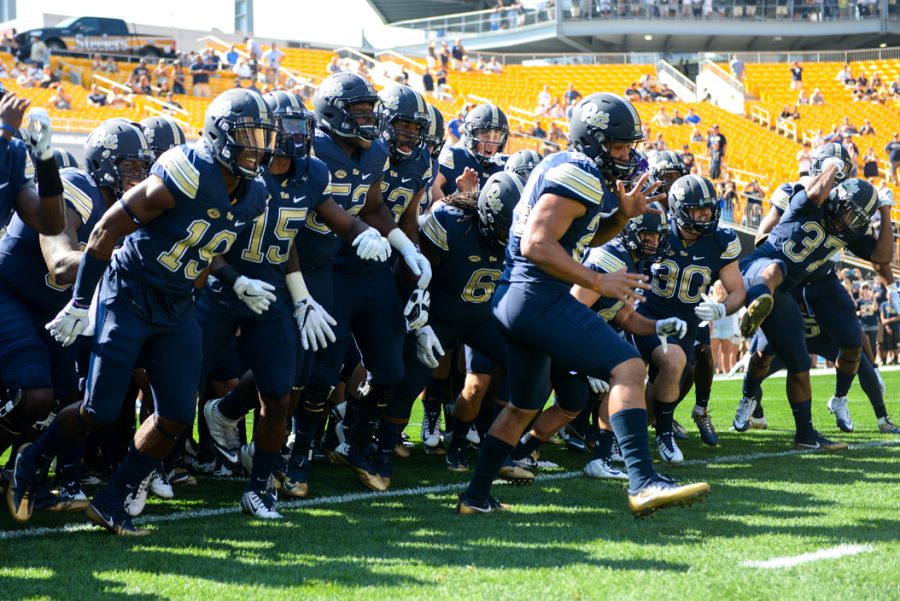From 2011 to 2014, Pitt football muddled its way to four straight 6-6 regular seasons. In head coach Pat Narduzzi’s first two seasons, the Panthers have drastically improved and enjoyed back-to-back 8-4 campaigns.
The program’s resurgence has been felt around the country this year, as the Panthers knocked off Penn State — effectively keeping the Nittany Lions out of the playoffs — and eventual national champion Clemson.
But, even with the big wins, Pitt has not been able to make the leap into the upper echelon of college football.
The program can’t blame its second-tier status on just one factor, but a major reason for Pitt’s exclusion from the top-flight football programs becomes clear annually on National Signing Day: Pitt is unable to attract high-profile recruits from the Pittsburgh area.
This year’s class is a perfect example of this reality. The Panthers’ 2017 group of 23 verbal commitments contains just five Western Pennsylvania Interscholastic Athletic League recruits, only two of whom rank inside Pennsylvania’s top 20 prospects according to 247 Sports.
Four- and five-star recruits such as cornerback Lamont Wade, tackle Joshua Lugg, guard CJ Thorpe and defensive end Donovan Jeter — the brother of Pitt basketball forward Sheldon Jeter — all starred on their Pittsburgh area high school teams last fall, but none of them chose to play for Pitt.
Central Catholic High School, which finished the 2016 season as the second-best team in the state, is 11 minutes walking distance from the Cathedral of Learning. Despite this extreme proximity, the Panthers were unable to attract a single recruit from the nearby powerhouse.
Obviously, Pitt gets some quality players from the area, including former wide receiver Tyler Boyd and two-time All-Pro defensive lineman Aaron Donald. The team does not get enough top talent, however, to have great teams.
When one looks at the top college football programs, one thing they all do well is recruit. A common refrain from these programs is “We don’t rebuild. We reload.” Because the Panthers cannot convince the best local players to stay in Western Pennsylvania, they do not have this luxury.
Just a few hours away, one program in State College, Pennsylvania, has developed a perfect example of this model.
A few years ago, the Penn State Nittany Lions were a mediocre program struggling in the wake of the Jerry Sandusky scandal. This year, they were Big Ten Champions and played in the Rose Bowl. How were they able to turn things around and nearly make the playoffs this season?
The answer is simple: by recruiting well in Pennsylvania.
When James Franklin was hired as Penn State’s football coach in 2014, he declared that the Nittany Lions would “dominate the state” in recruiting.
In the past three classes, Penn State has crushed Pitt in recruiting among the top players of the state. Over that span, the Nittany Lions have pulled in 13 recruits ranked in Pennsylvania’s top 10. Meanwhile, Pitt has only received three — Paris Ford, Damar Hamlin and Jordan Whitehead.
Whether or not he is an elite coach on gameday is still up for debate, but the charismatic coach’s ability to recruit in Pennsylvania has resurrected Penn State’s program and kept Pitt out of the national conversation. If the Panthers could land more key players, they would immediately enhance their national stature.
Since 1981, the Panthers have only one 10-win season: a 10-3 season under Dave Wannstedt in 2009. Other than that, the program has been stuck in mediocrity ever since Dan Marino graduated and went to the NFL in 1983. Pitt has earned the reputation of being a lower-tier Power Five program.
But the thing that hurts Pitt more than this reputation in gaining recruits is the atmosphere at games.
For years, the attendance at Pitt home games has been terrible –– the empty yellow seats of Heinz Field have become as much of a gameday tradition as “Sweet Caroline.” When potential future players travel to Pittsburgh, what they see at home games has to be a wake-up call. They look at the empty seats and the lackluster student support and wonder why they would choose to come to Pitt over offers from any other of the dozens of schools that sell out their games every week.
For Pitt’s football program to finally turn the corner, one of two things has to change — either the attendance or the on-field product.
The team has been on an upward trajectory since Narduzzi came on board, but apparently, an 8-4 record and a win over the team’s in-state rival is insufficient for sellouts.
For the program to take the next step, it must learn how to keep top talent in Western Pennsylvania by better marketing the team. Otherwise, the Panthers will continue losing out on the WPIAL’s best.


